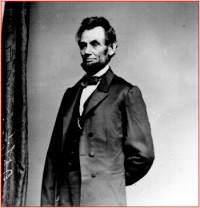Feature
Quiz Answer
Abraham Lincoln
 Abraham Lincoln (Born February 12, 1809, Died April 15, 1865) was the sixteenth President of the United States, serving from March 4, 1861 until his assassination. As an outspoken opponent of the expansion of slavery in the United States, Lincoln won the Republican Party nomination in 1860 and was elected president later that year. During his term, he helped preserve the United States by leading the defeat of the secessionist Confederate States of America in the American Civil War. He introduced measures that resulted in the abolition of slavery, issuing his Emancipation Proclamation in 1863 and promoting the passage of the Thirteenth Amendment to the Constitution in 1865. Abraham Lincoln (Born February 12, 1809, Died April 15, 1865) was the sixteenth President of the United States, serving from March 4, 1861 until his assassination. As an outspoken opponent of the expansion of slavery in the United States, Lincoln won the Republican Party nomination in 1860 and was elected president later that year. During his term, he helped preserve the United States by leading the defeat of the secessionist Confederate States of America in the American Civil War. He introduced measures that resulted in the abolition of slavery, issuing his Emancipation Proclamation in 1863 and promoting the passage of the Thirteenth Amendment to the Constitution in 1865.
Early life
Abraham Lincoln was born on February 12, 1809, to Thomas Lincoln and Nancy Hanks, two uneducated farmers, in a one-room log cabin on the 348-acre (1.4 km²) Sinking Spring Farm, in southeast Hardin County, Kentucky (now part of LaRue County).
When Lincoln was nine, his mother, then thirty-four years old, died of milk sickness. Soon afterwards, his father remarried to Sarah Bush Johnston. Lincoln's formal education consisted of about 18 months of schooling, but he was largely self-educated and an avid reader. He was also a talented local wrestler and skilled with an axe. At 6 foot 4 inches (1.93m), he was unusually tall, as well as strong.
Early political career
Lincoln began his political career in 1832, at age 23, with an unsuccessful campaign for the Illinois General Assembly, as a member of the Whig Party. The centerpiece of his platform was the undertaking of navigational improvements on the Sangamon River. He was elected captain of an Illinois militia company drawn from New Salem during the Black Hawk War.
For several months, Lincoln ran a small store in New Salem.
In 1834, he won election to the state legislature, and, after coming across the Commentaries on the Laws of England, began to teach himself law. Admitted to the bar in 1837, he moved to Springfield, Illinois, that same year and began to practice law with John T. Stuart. With a reputation as a formidable adversary during cross-examinations and in his closing arguments, Lincoln became one of the most respected and successful lawyers in Illinois and grew steadily more prosperous. He served four successive terms in the Illinois House of Representatives as a representative from Sangamon County, and became a leader of the Illinois Whig party. In 1837, he made his first protest against slavery in the Illinois House, stating that the institution was "founded on both injustice and bad policy."
Family
On November 4, 1842 Lincoln married Mary Todd, daughter of a prominent slave-owning family from Kentucky. The couple had four sons. Robert Todd Lincoln was born in Springfield, Illinois on 1 August 1843. Their only child to survive into adulthood, young Robert attended Phillips Exeter Academy and Harvard College.
Republican politics
Lincoln returned to politics in response to the Kansas-Nebraska Act (1854), which expressly repealed the limits on slavery's extent as determined by the Missouri Compromise (1820). In the October 16, 1854, "Peoria Speech", Lincoln first stood out among the other free soil orators of the day.
Entering the presidential nomination process as a distinct underdog, Lincoln was eventually chosen as the Republican candidate for the 1860 election for several reasons. On November 6, 1860, Lincoln was elected as the 16th President of the United States, beating Democrat Stephen A.
The assassination
Originally, John Wilkes Booth, a well-known actor and a Confederate spy from Maryland, had formulated a plan to kidnap Lincoln in exchange for the release of Confederate prisoners. After attending an April 11 speech in which Lincoln promoted voting rights for blacks, an incensed Booth changed his plans and determined to assassinate the president. Learning that the President and First Lady, together with the Grants, would be attending Ford's Theatre, he laid his plans, assigning his co-conspirators to assassinate Vice President Andrew Johnson and Secretary of State William H. Seward.
Without his main bodyguard Ward Hill Lamon, to whom he related his famous dream regarding his own assassination, Lincoln left to attend the play Our American Cousin on April 14, 1865. As a lone bodyguard wandered, and Lincoln sat in his state box (Box 7) in the balcony, Booth crept up behind the President and waited for the funniest line of the play, hoping the laughter would muffle the noise of the gunshot. When the laughter began, Booth jumped into the box and aimed a single-shot, round-slug .44 caliber Henry Deringer at his head, firing at point-blank range. Major Henry Rathbone momentarily grappled with Booth but was cut by Booth's knife. Booth then leapt to the stage and shouted, "Sic semper tyrannis!" (Latin: "Thus always to tyrants") and escaped, despite a broken leg suffered in the leap. A twelve-day manhunt ensued, in which Booth was chased by Federal agents (under the direction of Secretary of War Edwin M. Stanton). He was eventually cornered in a Virginia barn house and shot, dying of his wounds soon after.
|
